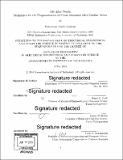Life after death : techniques for the prognostication of coma outcomes after cardiac arrest
Author(s)
Ghassemi, Mohammad Mahdi
DownloadFull printable version (15.10Mb)
Alternative title
Techniques for the prognostication of coma outcomes after cardiac arrest
Other Contributors
Massachusetts Institute of Technology. Department of Electrical Engineering and Computer Science.
Advisor
Roger G. Mark and Emery N. Brown.
Terms of use
Metadata
Show full item recordAbstract
Electroencephalography (EEG) features are known to predict neurological outcomes of patients in coma after cardiac arrest, but the association between EEG features and outcomes is time-dependent. Recent advances in machine learning allow temporally-dependent features to be learned from the EEG waveforms in a fully-automated way, allowing for faster, better-calibrated and more reliable prognostic predictions. In this thesis, we discuss three major contributions to the problem of coma prognostication after cardiac arrest: (1) the collection of the world's largest multi-center EEG database for patients in coma after cardiac arrest, (2) the development of time-dependent, interpretable, feature-based EEG models that may be used for both risk-scoring and decision support at the bedside, and (3) a careful comparison of the performance and utility of feature-based techniques to that of representation learning models that fully-automate the extraction of time-dependent features for outcome prognostication.
Description
Thesis: Ph. D., Massachusetts Institute of Technology, Department of Electrical Engineering and Computer Science, 2018. Cataloged from PDF version of thesis. Includes bibliographical references (pages 120-134).
Date issued
2018Department
Massachusetts Institute of Technology. Department of Electrical Engineering and Computer SciencePublisher
Massachusetts Institute of Technology
Keywords
Electrical Engineering and Computer Science.